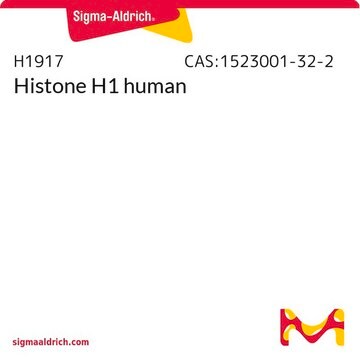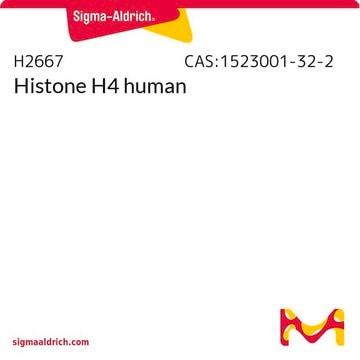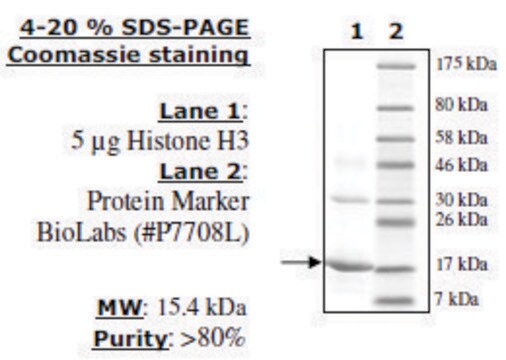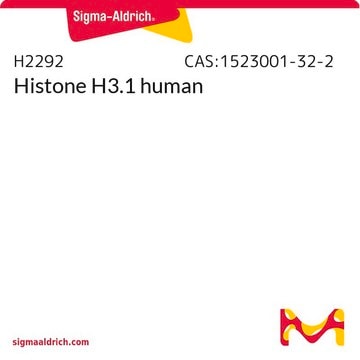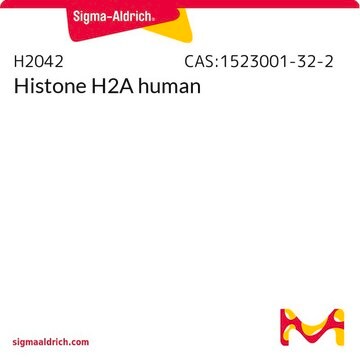14-155
Histone H1 Protein, 20 mg
Purified bovine Histone H1 protein for use as a substrate in histone modification assays (HAT, HDAC, DNMT) and chromatin assembly studies.
Szinonimák:
Linker Histone H1
Bejelentkezésa Szervezeti és Szerződéses árazás megtekintéséhez
Összes fotó(1)
About This Item
UNSPSC kód:
12352202
eCl@ss:
32160405
NACRES:
NA.32
Javasolt termékek
biológiai forrás
bovine
Minőségi szint
molekulatömeg
Mw 32 kDa
gyártó/kereskedő neve
Upstate®
technika/technikák
activity assay: suitable (kinase)
NCBI elérési szám
UniProt elérési szám
kiszállítva
dry ice
Általános leírás
H1 and related linker histones are important both for maintenance of higher-order chromatin structure and for the regulation of gene expression. Nucleosomal stabilization is provided through the binding of histone H1 to the nucleosomal dyad and the linker DNA entering and exiting the core particle. Additional experimental evidence illustrates the influence of histone H1 on chromatin arrangement and compaction. The family of histone H1 proteins contains five somatic variants (H1.1, H1.2, H1.3, H1.4 and H1.5) which are expressed in nearly all cell types.
Product Source: Lysine rich fraction from calf thymus
Minőség
Routinely evaluated by Kinase assay using cdk2/cyclin A, active (14-448) to phosphorylate Histone H1.
Fizikai forma
Sterilized through a 0.2 micron membrane filter
Tárolás és stabilitás
1 year at -20°C
Egyéb megjegyzések
For Specific Activity data, refer to the Certificate of Analysis for individual lots of this enzyme.
This product is derived from bovine source. Export of this product to certain countries may be restricted. Please contact Customer Service or your local distributor to inquire about product availability and export options.
Jogi információk
UPSTATE is a registered trademark of Merck KGaA, Darmstadt, Germany
Jogi nyilatkozat
Unless otherwise stated in our catalog or other company documentation accompanying the product(s), our products are intended for research use only and are not to be used for any other purpose, which includes but is not limited to, unauthorized commercial uses, in vitro diagnostic uses, ex vivo or in vivo therapeutic uses or any type of consumption or application to humans or animals.
Tárolási osztály kódja
12 - Non Combustible Liquids
WGK
nwg
Lobbanási pont (F)
Not applicable
Lobbanási pont (C)
Not applicable
Analitikai tanúsítványok (COA)
Analitikai tanúsítványok (COA) keresése a termék sarzs-/tételszámának megadásával. A sarzs- és tételszámok a termék címkéjén találhatók, a „Lot” vagy „Batch” szavak után.
Már rendelkezik ezzel a termékkel?
Az Ön által nemrégiben megvásárolt termékekre vonatkozó dokumentumokat a Dokumentumtárban találja.
Az ügyfelek ezeket is megtekintették
Hyo Kyun Chung et al.
The Journal of biological chemistry, 278(30), 28079-28088 (2003-04-30)
The Gadd45 family of proteins includes Gadd45alpha, MyD118/Gadd45beta, and CR6/OIG37/Gadd45gamma. These proteins play important roles in maintaining genomic stability and in regulating the cell cycle. This study reports the cloning of a novel protein called CR6-interacting factor 1 (CRIF1) which
B Ouyang et al.
The Journal of biological chemistry, 272(45), 28646-28651 (1997-11-14)
Human prk encodes a novel protein serine/threonine kinase capable of strongly phosphorylating casein but not histone H1 in vitro. prk expression is tightly regulated at various levels during different stages of the cell cycle in lung fibroblasts. The Prk kinase
Pim3 negatively regulates glucose-stimulated insulin secretion.
Gregory Vlacich,Martijn C Nawijn,Gene C Webb,Donald F Steiner
Islets null
Rocío Montes de Oca et al.
The Journal of biological chemistry, 280(51), 42252-42262 (2005-10-06)
Barrier to autointegration factor (BAF) is an essential conserved double-stranded DNA-binding protein in metazoans. BAF binds directly to LEM domain nuclear proteins (e.g. LAP2, Emerin, and MAN1), lamin A, homeodomain transcription factors, and human immunodeficiency virus type 1-encoded proteins. BAF
J Pan et al.
Oncogene, 29(47), 6245-6256 (2010-08-31)
We report here a novel role for Jun dimerization protein-2 (JDP2) as a regulator of the progression of normal cells through the cell cycle. To determine the role of JDP2 in vivo, we generated Jdp2-knockout (Jdp2KO) mice by targeting exon-1
Tudóscsoportunk valamennyi kutatási területen rendelkezik tapasztalattal, beleértve az élettudományt, az anyagtudományt, a kémiai szintézist, a kromatográfiát, az analitikát és még sok más területet.
Lépjen kapcsolatba a szaktanácsadással